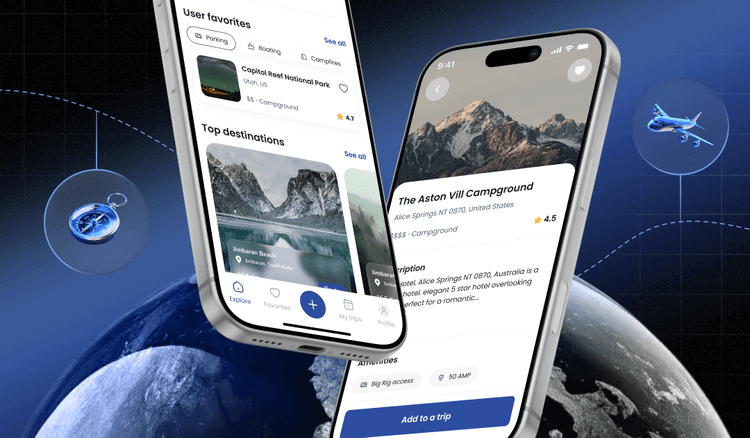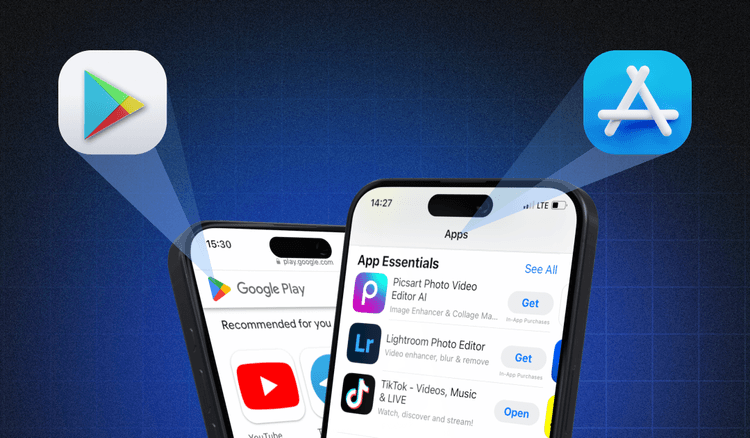We bet you can hardly name anyone not using at least one social media app. Unless they don’t have a smartphone at all.
In today's digital age, connectivity, and communication reign supreme so creating a social media app definitely worth it. Statista claims that users spend on average 143 minutes on social media daily, confirming that it’s a promising market.
However, the ability to build a platform that connects people, fosters communities, and empowers users to express themselves is both exciting and challenging. If you wonder how to make a social media app and unleash its potential, you've come to the right page.
In this ultimate guide, we'll describe the key peculiarities related to social media app creation, explore the step-by-step process, delve into essential features, and uncover key considerations.
Why creating a social media app is a profitable idea?
Knowing such giants of the industry as TikTok and Instagram, any startup owner may have a completely logical question: Does the world need another social media application?
And the answer to this question is "absolutely yes". Here's why:
Social media apps generate a vast user base and engagement
As of 2024, Statista estimates that the global social media user base includes over five billion people. This extensive user base provides a significant opportunity to tap into untouched audiences and communities. By understanding their needs, interests, and preferences, you can tailor your social app to cater specifically to their requirements.
This focused targeting elevates a sense of community and offers a platform for like-minded individuals who may have previously lacked a safe place to communicate. Following this idea, we have recently created a social app for LGBTQ+ community for our client.
Influencer marketing is gaining momentum
The influencer marketing industry is booming these days, and it’s irrational to ignore this fact. In just a few years, influencer marketing has experienced exponential growth, surging from a modest $1.7 billion in 2016 to a projected $24 billion in 2024. What does that mean for potential app providers?
Influencers can drive increased activity and engagement within the app by inspiring their followers and fueling the growth of the app's user community. Brands and businesses are also drawn to social media apps that have a strong influencer presence, as it offers an opportunity to reach their target audience effectively.
The social media landscape is dynamic and ever-evolving
New social media trends, features, and technologies emerge constantly, presenting opportunities for creating innovative social media apps. By staying up to date with industry trends and user preferences, your social media app has all chances to attract and retain users.
Additionally, if you integrate some emerging technologies like artificial intelligence (AI) and augmented reality (AR), you can significantly enhance user experiences and increase your monetization potential.
Let's discuss your social media app idea!
Contact usTypes of social media apps
A social media app is a very broad term. The diverse landscape of social media encompasses various types of apps, each catering to different needs and preferences of users.
Let's explore 5 most popular types:
-
Social networks;
-
Content sharing and streaming apps;
- Messengers;
-
Professional networks;
-
Community-based apps and forums.
Social networks: Apps like Facebook and Twitter focus on connecting users with friends, family, colleagues, and acquaintances. They help to maintain personal relationships and facilitate communication through features like user profiles, news feeds, and sharing options.
Content sharing and streaming apps: This type is the most binge-worthy one as such apps encourage users to share visual content, such as photos, videos, and music. Who hasn't scrolled TikTok or Instagram for hours?
Messengers: These apps facilitate private and group real-time communication through text, voice, and video messages. They also offer additional features such as stickers, emojis, and multimedia sharing. WhatsApp, Telegram, and WeChat fall into this category.
Professional networks: When people seek to expand their professional connections, find job opportunities, and join industry-specific discussions, professional networking apps are at their service. They provide features like user profiles, resume building, job searching, and business networking. LinkedIn is the most prominent example in this category.
Community-based apps & forums: If you want to join some discussions, ask questions, and share knowledge on specific topics, you’ll probably open apps like Quora and Reddit. These platforms prioritize user-generated content, fostering communities built around shared expertise or interests.
How to create a social media app: must-have features
Although each social media application has its own recipe, there’s a set of basic “ingredients” that come as must-haves.
Let’s take a closer look at the key features that your future social media app can’t do without:
-
User profiles
-
Content posting
-
Interactions
-
Direct messaging
-
Notifications
-
Privacy settings
-
Search
User profiles
Speaking of the foundation of a social media app, enabling users to create a personalized profile is the very first thing you should think about. Include features like profile avatars, bio sections, and customizable settings to help users express their personalities and interests.
Content posting
The news feed is the core element of a social media app, displaying a curated stream of content from the users and their followers. Your social media app should have a variety of tools for content posting such as photo/video filters, sharing options, tagging functionalities, captions, and more.
Interactions
Facilitate social interactions between users by providing features such as liking, commenting, tagging, and post-sharing. They can enhance engagement and collaboration.
Direct messaging
While being the essence of messaging apps, you can add DMs in any type of social media app. By providing a private and secure communication channel within the app, you empower users to discuss sensitive topics away from the public eye.
Notifications
Implement a robust notification system that keeps users informed about relevant activities, new posts, and reactions. Notifications help users stay engaged with the app and promote real-time interactions.
Privacy settings
Prioritize user privacy by offering robust privacy settings. Allow users to control who can view their posts, who can send them messages, and what information is publicly visible on their profiles. Give users the ability to manage their privacy preferences and ensure data protection.
Search
Introduce smart search tools to help users discover relevant content, accounts, and communities. The search feature may include advanced search filters, trending topics, and personalized recommendations.
Social app trends
If you’re planning to create a disruptive app, make sure you’re staying abreast of the latest industry trends and, if possible, implementing them in your product.
Here’re the features you should consider:
AI integration
Metaverse is gaining traction in social media apps, offering users interactive and immersive experiences. Translated into figures, global AI use in social media is expected to increase at a CAGR of 28.7% from 2022 to 2031. AI-powered filters, effects, and avatars enable users to transform their selfies, videos, and stories with creative overlays, while AI assistants create templates and help them write messages and posts. The integration of AI image generators in these platforms has further expanded creative possibilities, allowing users to easily produce high-quality visual content without the need for advanced design skills. Similarly, the integration of AI in telecom is reshaping the telecommunications industry, offering enhanced network optimization, improved customer service, and advanced data analytics capabilities.
Best AI business ideas for startups to try in 2026
Read articleVideo content
Short-form video content, such as TikToks and Reels, is the most popular type of social media content. Statistically, 96% of consumers opt to watch short videos when searching for information about some product or service. As such, providing users with a dynamic and visually engaging way to express themselves or promote some products (if your platform supports that) is a win-win option. For brands focused specifically on short-form video marketing on TikTok, partnering with a TikTok agency is key. A TikTok agency brings proven expertise in content strategy, ad campaigns and influencer partnerships tailored for the TikTok platform.
Personalization algorithms
More and more social media apps leverage advanced algorithms to build personalized feeds for users. By analyzing user preferences, behavior, and interactions, such algorithms ensure that users see only relevant content and have a satisfying user experience.
E-commerce integration
Driven by the influencer marketing trend, more brands are turning to social media as a tool to increase their reach and sales. Thus, integrating e-commerce functionalities like product tags and sponsored content can help you attract influencers and brands to your app.
How to build a social media app: step-by-step process
Step 1: Discovery phase
Start by identifying your target audience, conducting market research, and analyzing existing social media apps, and think about app monetization strategy. Understand user needs, identify gaps, and create a unique value proposition for your app.
Mastering the Discovery Phase: Definitive guide
Read articleStep 2: Define app functionality
Outline the features you plan to implement, depending on your social media app type. Additionally, consider incorporating innovative features that can differentiate your app from competitors and boost user engagement.
Step 3: Prototyping and UI/UX design
Create prototypes to visualize the user interface and flow of your app. Prototyping helps to refine the user experience and gather feedback from potential users. Once done, you can proceed with crafting an intuitive and visually appealing UX/UI design. Pay attention to usability, ease of navigation, and delightful aesthetics.
Step 4: Social media app development
Build the server-side infrastructure, including databases, APIs, and cloud storage, to handle user data, content delivery, and in-app functionality. Choose a secure technology stack that suits your app's requirements and is available for further scaling.
Step 5: Testing and deployment
Test the app rigorously to detect and fix possible bugs or performance issues. Once the app passes testing, deploy it to the desired platforms and optimize it for the respective app stores.
Step 6: Post-release support
After the app launch, your journey doesn't actually end. Providing ongoing support is crucial to ensure that users have a bug-free journey with your app.
don't know where to start? don't hesitate to get a free consultation!
Contact usCost of building a social media app
Given various types and tech stacks, the cost of developing a social media app varies greatly. A rough estimate for building a basic social media app can range from $50,000 to $200,000.
How much does it cost to develop an app?
Read articleThe cost concern is like an elephant in the room, especially if you’re a fresh startup. But there are a couple of hints on how to make a social media app, staying within a planned budget or even cutting some costs:
-
Adopt a Minimum Viable Product (MVP) approach to focus on essential features and launch the app with basic functionalities. Early feedback will guide future iterations, ensuring you invest resources in areas that provide the most value to users.
-
Implement an Agile development methodology as a way to minimize spending. Agile emphasizes iterative development and frequent testing, allowing early resolution of issues.
-
Consider outsourcing certain aspects or the whole app development process to offshore teams. Outsourcing opens access to global expertise, which often provides more competitive labor costs than in the U.S. or Canada, and without compromising quality.
Anyways, you can find out the cost for your exact case only after a precise estimate based on your specific requirements.
contact us to schedule a free consultation!
Contact usHow to create a social media app: SolveIt experience
We know that starting social media app development may feel risky and bumpy. But outsourcing can tangibly alleviate the process.
At Solveit, we’ve studied the nuances of developing a mobile application inside and out and obtained experience in working particularly with social media apps.
Streaming app
For one of our clients, we developed a streaming platform that allows users stream their live videos, communicate with other users, and participate in battles. The application has its own currency (coins) for the purchase of prizes that can further be exchanged for real money.
We made this social media app from scratch, starting with a discovery phase and prototyping. In 4 months, we launched the MVP for iOS and the admin panel.
Features include:
-
Authorization and profile management;
-
Broadcasts: view, conduct, interact, chat with other users;
-
Subscribe to other users,
-
Apply Agora filters to videos;
-
Buy and send gifts, exchange them on real money;
-
Push notifications.
LGBTQ+ Social media app
In our recent project, the SolveIt team developed a social network app aimed at connecting like-minded people and creating a comfortable digital space for the LGBTQ+ community.
The client turned to us after working with another vendor, who failed to deliver the project. The application was only 20% ready, and the client had strict deadlines. We started with a review of the available functionality, and in 7 months, we launched a cross-platform Flutter application with an eye-catching design.
Features include:
-
User authentication;
-
Profile setup and management
-
Friend-finder;
-
Direct messages;
-
Events: find, create private or public events.
-
Notifications
-
Search for LGBTQ-friendly businesses and review the experience.
By collaborating with Solveit, you gain access to our skilled professionals, determined to optimize the development workflow and deliver a high-quality app that resonates with your target audience and business needs.
So if you need a trusted development partner to create your own social media app, we’ll be excited to become one.
Final words
Creating a social media app can be a rewarding endeavor, considering the immense popularity and revenue potential of this industry. And by following the steps outlined in this guide, you can easily turn your app idea into reality.
If you need any assistance on the way to making your social media app a game changer, contact our SolveIt team and we’ll be happy to guide you through the development journey.
Ready to transform your social media app idea into reality?
Contact usFAQ
How to make a social media app?
To make a profitable social media app you can follow this step-by-step process:
-
Start with discovery phase to identify product/market fit, target audience, your USP
-
Define social media app functionality
-
Create prototype and UI/UX design for your app
-
Develop your social media app
-
Test, deploy and optimize your social media app
-
Provide your app users with post-release support
What are the must-have features for social media apps?
The key features that your future social media app can’t do without:
-
User profiles
-
Content posting
-
Interactions
-
Direct messaging
-
Notifications
-
Privacy settings
-
Search
How much does it cost to make a social media app?
The cost of developing a social media app can vary depending on factors such as app complexity, features, design, and technology stack. A rough estimate for building a social media app can range from $50000 to 200000$. The final cost is influenced by the overall complexity of the app, which means the cost can increase or decrease based on the specific app requirements.
Basic level complexity social media app will cost $50,000 - $100,000
Medium level complexity social media app will cost $100,000 - $200,000
High level complexity social media app will cost $200,000 and up
How long does it take to make a social media app?
Here's a rough estimation of the development timeline for different levels of social media app complexity:
Basic level complexity from 3 to 6 months
Medium level complexity from 6 to 12 months
High level complexity from 12 months and more


![How to create a fitness app: complete development guide [steps, features, costs]](/_next/image?url=https%3A%2F%2Fsolveit.dev%2Frails%2Factive_storage%2Fblobs%2FeyJfcmFpbHMiOnsibWVzc2FnZSI6IkJBaHBBaVlDIiwiZXhwIjpudWxsLCJwdXIiOiJibG9iX2lkIn19--f4f49625f7b386f020ef279402f1313a6711742a%2FHow%2520to%2520build%2520a%2520fitness%2520app1-min.jpg&w=750&q=75)
